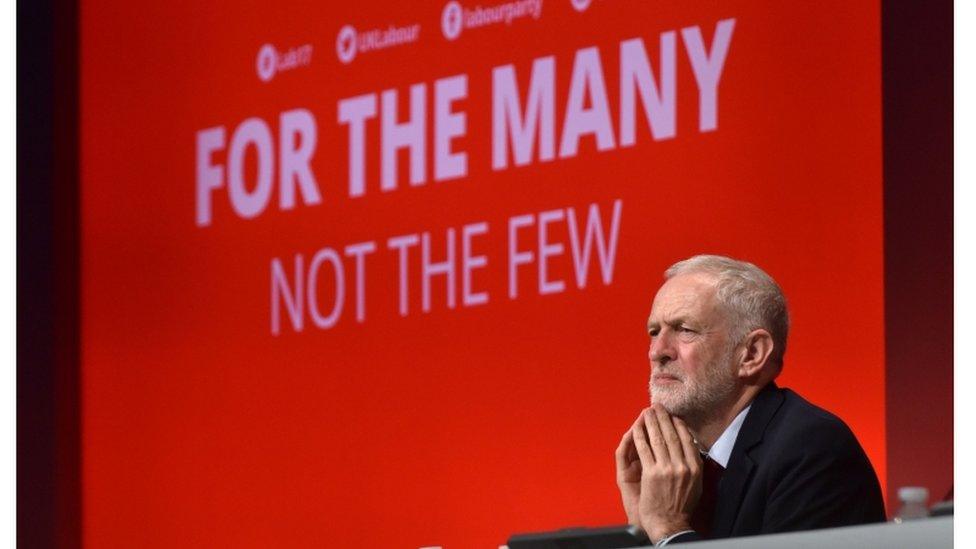Labour conference: Decoding Corbyn's Brexit stance
- Published

Last week Reality Check highlighted the main points of the prime minister's speech on Brexit in Florence. Jeremy Corbyn's speech at the Labour party conference in Brighton had a much broader remit, but included a substantial section on Brexit. The BBC's Reality Check correspondent Chris Morris has been looking at what he said.


What's the significance? There's an element of the pot calling the kettle black here.
Divisions over Brexit within the Labour Party are pretty well documented and the only way the party has avoided Brexit overshadowing this conference is to have no votes on contentious issues such as free movement or continuing membership of the single market.
Overall, Labour's policy on Brexit is far from clear, partly because it has become an issue that crosses party lines.
There was nothing in this speech, for example, on how much Labour might be prepared to pay for a financial settlement with the EU before the UK leaves.

!["Theresa May, please, if you're watching... give them [EU citizens] the full guarantees they deserve today. Because if you don't we will when we're in government"](https://ichef.bbci.co.uk/ace/standard/640/cpsprodpb/17A05/production/_98037769_corbyn_quote2_640-nc.png)
What's the significance? What does Mr Corbyn mean by "full guarantees"?
Would Labour accept the European Court of Justice (ECJ), for example, as the ultimate legal arbiter of an agreement on citizens' rights, which is what the EU wants?
Mr Corbyn didn't mention the ECJ in his speech, but shadow Brexit secretary Sir Keir Starmer has suggested in the past that Labour would struggle to accept that.
All sides agree that it is important to give certainty to EU citizens in the UK and UK citizens elsewhere in the EU as soon as possible.
But once again there is an element of creative ambiguity in the Labour leader's pronouncements on Brexit.
It is the negotiating team currently in Brussels that has to delve down into the technical and legal details to try to forge a compromise.


What's the significance? For months, Mr Corbyn's stock line has been that Labour wants "tariff-free trade access" to the single market.
That's now been amended to "unimpeded access" - presumably to take account of the fact that tariffs don't apply to the service sector, which accounts for more than three-quarters of the UK economy.
What are known as non-tariff barriers (like regulations and standards) are equally, if not more, important.
But even now, Mr Corbyn's remarks appear to ignore the EU's repeated insistence that you can't have unimpeded access (or "frictionless trade" in the government's current terminology) unless you are a full member of the single market and the customs union.
Labour's London Mayor Sadiq Khan said this week that the UK should stay in the single market in the long term - others in the Labour Party disagree.


What's the significance? This is another awkward issue for Labour because there are certainly those on the left who believe free movement has driven down wages.
It's just as difficult for Labour to support immigration but also pledge to limit free movement as it is for the Conservatives - a case of having your stick of Brighton rock and eating it.
Perception is important but a Bank of England report in 2015, external suggested that evidence for a link between immigration and low wages was relatively marginal.
A 10 percentage point increase in the proportion of immigrants working in an unskilled or semi-skilled service sector, it concluded, would be associated with a 1.88% reduction in pay.


